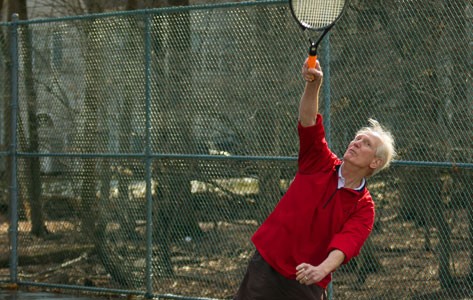Tom D. recalls little about August 5, 2017, other than the fact that it began as a typical Saturday – with plans for a competitive doubles match on the tennis courts. Healthy, active and exceptionally fit, the 68-year-old Pompton Plains resident is a self-described “tennis fanatic” who has played tennis for over 30 years and at least three times a week since retiring in 2015.
On that fateful morning, Tom seemed to be on top of his game. In fact, according to his friends, he had just stroked an impressive volley before struggling to catch his breath. Minutes later, Tom was in sudden cardiac arrest.
Luck on his Side
Although he suffered a medical trauma, Tom reflects upon the incident with gratitude. In his view, the circumstances and events that ensued are nothing short of a miracle – from the swift intervention of his tennis buddies and first responders to the highly specialized care he received at Chilton Medical Center.
“I still marvel at the severity of the situation and how everything fell into place,” he says. “It’s amazing that I survived.”
For starters, one of Tom’s tennis partners was trained in CPR and performed chest compressions until the Wanaque Police Department arrived. Officers revived Tom with the assistance of an automatic external defibrillator before transferring his care to paramedics, who resuscitated Tom a second time and rushed him to Chilton Medical Center – another stroke of luck.
As part of its expanding continuum of services, Chilton Medical Center is among few community hospitals equipped to provide mechanical cardiac support, a clinical innovation that helped to save Tom’s life.
Advanced Cardiac Care
When Tom reached the Emergency Department, the medical team was ready for his arrival. An echocardiogram confirmed that he was having a heart attack and needed angioplasty, a procedure that allows doctors to identify and treat blockages in the arteries. As nurses prepared Tom for treatment, his wife, Beverly, was introduced to interventional cardiologist Lawrence Blitz, MD, who instilled a sense of confidence.
“In the midst of a critical situation, Dr. Blitz explained everything to me in a knowledgeable, yet compassionate way,” she notes. “From the moment I met him, I knew we’d been blessed with a wonderful doctor who would do everything possible.”
As it turned out, Beverly’s instincts were right because as they moved Tom to the Cardiac Catheterization Laboratory, another crisis emerged. He went into cardiogenic shock, a rare, often fatal condition in which a suddenly weakened heart cannot pump enough blood and oxygen to the body’s vital organs.
“Patients who go into cardiogenic shock as a result of a heart attack have about a 50 percent chance of survival,” states Dr. Blitz. Delayed treatment at this stage could lead to permanent organ failure, brain damage, or loss of life.
As Tom’s blood pressure plummeted, Dr. Blitz implanted a mechanical heart pump, called a left ventricular assist device (LVAD), inside Tom’s heart. The device is so small that it fits on the tip of a catheter, which is threaded to the heart through an artery in the leg. The LVAD worked immediately, restoring normal blood flow while allowing Tom’s heart to recover. Once his condition had stabilized, Dr. Blitz treated the heart attack by clearing the blocked artery and inserting two stents.
“Mechanical cardiac support is the most effective way to support a failing heart during cardiogenic shock, though it is uncommon for a community hospital to have this capability,” adds Dr. Blitz. Chilton acquired the new technology as part of Atlantic Health System’s commitment to provide all patients with leading edge cardiac care.

A Remarkable Recovery
Tom was transferred to Morristown Medical Center, another Atlantic Health System hospital and a nationally ranked cardiology program, for continued monitoring and critical care.
“The transfer was seamless,” remarks Beverly. “Dr. Blitz remained his cardiologist, which was very reassuring.”
Thanks to the expertise of Dr. Blitz, the full resources of Chilton Medical Center and Atlantic Health System’s vast network of advanced heart care, Tom defied the odds and survived two life-threatening cardiac emergencies without suffering any neurological injury or significant heart muscle damage.
"I'm incredibly proud of the Catheterization Lab and Emergency Department staff for their rapid response and the great care they provided, as it is moments like this where it matters most,” says Dina Tortorelli, manager of Cardiovascular Services, Chilton Medical Center.
Within 24 hours, Tom’s heart had healed enough to start pumping on its own again, enabling Dr. Blitz to remove the LVAD and discharge him from the hospital two days later. Today, following 12 weeks of outpatient cardiac rehabilitation, Tom is back on the tennis court and in full swing.
“I’m so fortunate,” he says. “If I’d been taken to a different hospital, I may have had a different outcome.”
As a gesture of appreciation, Tom and Beverly have decided to pay it forward with a donation to support Dr. Blitz’s amazing work at Chilton Medical Center, hoping their gift will benefit future heart patients whose lives also depend on having state-of-the-art cardiac care available in their community.
Request More Information
Please use the form to request more information.
All fields are required.
Please note that this form is for North American residents only.
